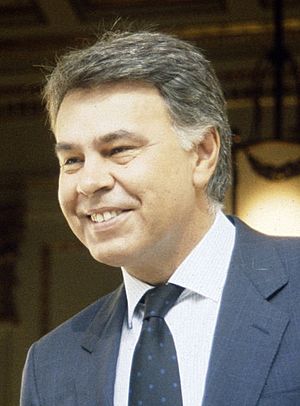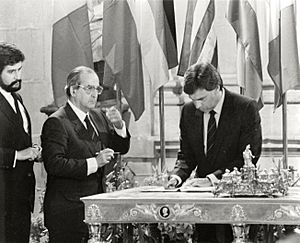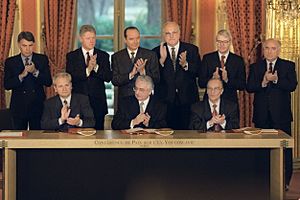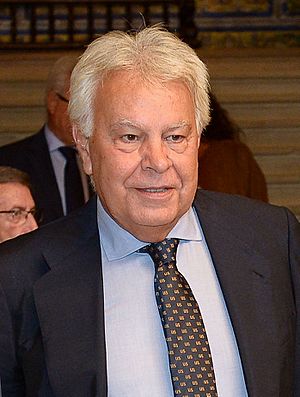Felipe González facts for kids
Quick facts for kids
The Most Excellent
Felipe González
|
|
|---|---|

González in 1991
|
|
| Prime Minister of Spain | |
| In office 2 December 1982 – 5 May 1996 |
|
| Monarch | Juan Carlos I |
| Deputy | |
| Preceded by | Leopoldo Calvo-Sotelo |
| Succeeded by | José María Aznar |
| Secretary-General of the Spanish Socialist Workers' Party | |
| In office 28 September 1979 – 21 June 1997 |
|
| President | Ramón Rubial |
| Deputy | Alfonso Guerra |
| Preceded by | Caretaker committee |
| Succeeded by | Joaquín Almunia |
| In office 13 October 1974 – 20 May 1979 |
|
| President | Ramón Rubial (1976–1979) |
| Preceded by | Rodolfo Llopis |
| Succeeded by | Caretaker committee |
| Leader of the Opposition | |
| In office 5 May 1996 – 21 June 1997 |
|
| Prime Minister | José María Aznar |
| Preceded by | José María Aznar |
| Succeeded by | Joaquín Almunia |
| Member of the Congress of Deputies | |
| In office 29 March 2000 – 2 April 2004 |
|
| Constituency | Seville |
| In office 2 July 1977 – 5 April 2000 |
|
| Constituency | Madrid |
| Personal details | |
| Born |
Felipe González Márquez
5 March 1942 Seville, Spain |
| Political party | Spanish Socialist Workers' Party |
| Spouses | |
| Children | 3 |
| Education | University of Seville |
| Signature | |
Felipe González Márquez (born March 5, 1942) is a Spanish politician who served as the Prime Minister of Spain from 1982 to 1996. He was also the leader of the Spanish Socialist Workers' Party (PSOE) from 1974 to 1997. He is the longest-serving prime minister in Spain's democratic history.
González joined the PSOE in 1964. At that time, Spain was under the rule of Francisco Franco, and political parties like the PSOE were banned. He earned a law degree from the University of Seville in 1965. In 1974, the PSOE chose him as its leader.
He played a key role in Spain's change to a democracy after Franco's death. His party, the PSOE, came in second place in the 1977 and 1979 elections.
The PSOE won the 1982 election by a large margin. González became prime minister and led the government for more than 13 years. He won three more elections in 1986, 1989, and 1993. In 1996, he lost the election to José María Aznar.
Contents
Early Life and Career
Felipe González was born in Bellavista, a neighborhood in Seville, Spain. His father owned a small dairy farm. He studied law at the University of Seville and became a lawyer who helped workers with legal problems.
While in college, he secretly joined the PSOE. This was dangerous because the government of Francisco Franco did not allow other political parties. To protect his identity, he used the nickname Isidoro.
After Franco died, González became a very important leader in the new democratic Spain. He worked with Prime Minister Adolfo Suárez to help the country become a democracy peacefully. In the first free elections in 1977, the PSOE became the main opposition party. This made González a well-known and popular young leader.
Prime Minister of Spain (1982–1996)
In the 1982 election, the PSOE won a huge victory. On December 2, 1982, González became the Prime Minister of Spain. His government was the first since the Spanish Civil War where no members had worked for the Franco government.
People were very excited and hoped for big changes. Under González, Spain went through many reforms.
Social and Economic Changes
González's government made many improvements for Spanish citizens.
- Social Reforms: The government expanded the social security system, which helps people who are sick, unemployed, or retired. It also improved education and made it easier for more people to go to college.
- Economic Reforms: The government worked to modernize Spain's economy. It also nationalized (put under government control) a large private company called Rumasa to protect people's savings and jobs.
- Infrastructure: Spain's roads, highways, and airports were greatly improved. The country's first high-speed trains were also built. Many new schools, theaters, and museums were created.
Joining Europe and NATO
A major achievement of González's time as prime minister was leading Spain into the European Economic Community (EEC) in 1986. The EEC later became the European Union. This was a big step for Spain's economy and its place in the world.
Also in 1986, González held a vote on whether Spain should stay in NATO, a military alliance. He and his party had been against it before, but he changed his mind and convinced the Spanish people to vote "yes."
Later Years as Prime Minister
González won elections again in 1989 and 1993. In his last term, he had to work with smaller political parties to form a government.
Towards the end of his time in office, his government faced problems. There were accusations of corruption and claims that the government had supported a secret group, the GAL, to fight the terrorist group ETA. These issues caused the PSOE to lose support.
In the 1996 election, the PSOE lost to the People's Party, and José María Aznar became the new prime minister.
Foreign Policy
González was an important figure on the world stage.
- European Integration: He worked closely with leaders like François Mitterrand of France and Helmut Kohl of Germany to strengthen Europe.
- Middle East Peace: His government officially recognized Israel in 1986. In 1991, Spain hosted the Madrid Conference of 1991, an important peace conference between Israelis and Palestinians.
- Dayton Agreement: In 1995, he was one of the signers of the Dayton Agreement, which helped end the war in Bosnia and Herzegovina.
Life After Politics (1996–Present)
After leaving office in 1996, González remained an important figure. He resigned as the leader of the PSOE party in 1997 but continued to influence it.
He has worked on international projects. In 2007, he was appointed as a special representative for the 200th anniversary of the independence of Latin American countries. He also led a group to think about the future of the European Union.
González is a member of the Club of Madrid, an organization of former democratic world leaders. He has also been critical of some political movements, such as the Podemos party in Spain.
Personal Life
González married Carmen Romero López in 1969, and they have three children. They divorced in 2008. In 2012, he married Mar García Vaquero.
One of his hobbies is caring for bonsai trees. He donated many of the trees he grew while living at the Palacio de la Moncloa (the prime minister's residence) to the Royal Botanic Garden of Madrid.
Published Works
- Un discurso ético (An Ethical Discourse), 1982
- El Socialismo (Socialism), 1997
- El futuro no es lo que era (The Future is Not What It Was), 2002
- Memorias del futuro (Memories of the Future), 2003
- Mi idea de Europa (My Idea of Europe), 2011
Images for kids
-
Felipe González meets with Shimon Peres in 1986. This meeting helped establish diplomatic relations between Spain and Israel.
See also
 In Spanish: Felipe González para niños
In Spanish: Felipe González para niños
- Governments of Felipe González
- History of Spain
- List of prime ministers of Spain
- Politics of Spain
 | Charles R. Drew |
 | Benjamin Banneker |
 | Jane C. Wright |
 | Roger Arliner Young |







